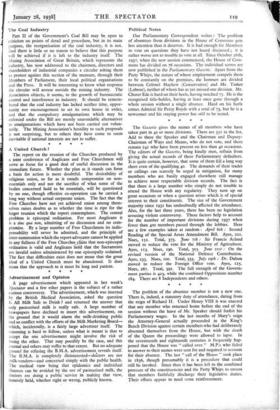The Gazette gives the names of all members who have
taken part in 40 or more divisions. There are 351 in the list. Add to these the Speaker and the Chairman and Deputy- Chairman of Ways and Means, who do not vote, and there remain 241 who have been present on less than 40 occasions. The editors of the Gazette, being kindly men, refrain from giving the actual records of these Parliamentary defaulters. It is quite certain, however, that some of them fell a long way short even of the qualifying 4o. The demands of their trades or callings can scarcely be urged in mitigation, for many members who are busily engaged elsewhere still manage to achieve most respectable division records. The fact is that there is a large number who simply do not trouble to attend the House with any regularity. They turn up on great occasions or when a question arises which is of special interest to their constituents. The size of the Government majority since 1931 has undoubtedly affected the attendance. Also, for the last three years, there has been no legislation arousing violent controversy. These factors help to account for the number of important divisions during 1937 when fewer than 40o members passed through the lobbies. Here are a few examples taken at random : April 6th : Second Reading of the Special Areas Amendment Bill. Ayes, 221. Noes, 152. Total, 373. June 7th : Sir Francis Acland moved to reduce the vote for the Ministry of Agriculture. Ayes, 113. Noes, 19o. Total, 303. June 2rst : On the revised version of the National Defence Contribution. Ayes, 233. Noes, too. Total, 333. July 19th : Dr. Dalton moved to reduce the Foreign Office vote. Ayes, 125. Noes, 267. Total, 392. The full strength of the Govern- ment parties is 423, while the combined Oppositions number 184. There are 8 Independents and others.


















































 Previous page
Previous page